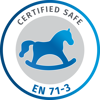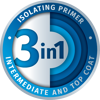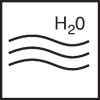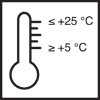Article No. 774483
Water-based weatherproofing, metal protection and coloured varnish. For use as primer, intermediate and finishing coat on wood, metal and PVC


Product specifications
The stated values represent typical product characteristics and are not to be construed as binding product specifications.
Field of application
- Interior and exterior use
- Wood, metal & PVC
- Windows, doors & garage doors
- Downpipes & gutters
- Radiators
- Summerhouses, carports & conservatories
- Profile boards, fences & railings
- Cladding, ceiling & wall panelling
- Primer, intermediate and finishing coat
- Can also be used as a maintenance coat
Properties
- Water-based
- Ventilating effect
- Isolating effect against substances contained in the wood
- Tested corrosion protection according to DIN EN ISO 12944-6
- Inhibits rust from screws and nail heads
- Highly weather-resistant and low-chalking
- Good edge coverage
- Weatherproof and moisture-regulating
- Resistant to yellowing
- Very resistant to dirt
- Very good adhesion to the substrate
- Block resistant (as per EN-927-10)
- Reduces discolouration due to nicotine
-
Preparation
-
Substrate requirements
The substrate must be clean, dry, free of dust, grease and loose substances, and prepared in the correct manner.
Dimensionally stable wood building elements: wood moisture content 11-15%
Wood building elements with limited or no dimensional stability: wood moisture content max. 18%
-
Preparations
Thoroughly remove any dirt, grease and non-adhering old coatings.
Wood substrates:
Thoroughly sand any old coatings that are still intact.
Sand grey and weathered wood surfaces down to sound, bright wood.
Remove loose and torn knots as well as resin that bleeds and clean with a suitable product (e.g. Remmers thinner & brush cleaner).
Exterior wood that needs to be protected against soft rot and blue stain must be pre-treated with a suitable wood preservative* (*Use biocides safely. Always read the label and product information before use).
The drying times must be observed.
Observe BFS Code of Practice No. 18 "Coatings on Wood and Wooden Working Materials in Outdoor Areas".
Rigid PVC, aluminium (not anodised) and zinc (galvanised steel):
Use an abrasive pad to apply an ammoniacal wetting agent. Observe BFS Code of Practice No. 22 for rigid PVC, BFS Code of Practice No. 6 for aluminium and BFS Code of Practice No. 5 for zinc.
Load-bearing old coatings:
Remove any old coatings not capable of supporting a load, making sure not to leave any residue.
Only apply coatings to non-chalking substrates that are capable of bearing a load.
Refer to BFS Code of Practice No. 20.
Iron, steel:
Derust thoroughly. Remove scale layers and rolling skin (derust manually to SA 3 standard of cleanliness). The best results are achieved if the substrate has been sand blasted to SA 2.5 standard of cleanliness (DIN EN ISO 12944-4).
Round off sharp edges and ridges.
Refer to BFS Code of Practice No. 20.
-
-
Application
-
Stir well.
Apply with a brush, roller or by spraying.
- Spraying parameters for light and dark colours:
Airmix spraying: nozzle 0.28 - 0.33 mm, material pressure: 100 - 140 bar,
atomiser air pressure: 1.2 - 2 bar.Airless spraying: nozzle 0.28 - 0.33 mm, material pressure: 180 - 200 bar
- Spraying parameters for metallic colours (iron grey, DB-703):
Airless spraying: nozzle 0.33 - 0.38 mm, material pressure 180 - 200 bar,
pistol filter 300 - 600 µm.Apply further coats once dry.
Seal opened containers well and use contents as soon as possible.
-
Application instructions
-
Check the product’s compatibility, adhesion and sealing effect on the substrate by applying to trial areas.
Cut end-grain surfaces at the bottom to create a water-drip edge.
End-grain wood preservative should first be applied to end-grain wood and cut surfaces in order to protect them against moisture.
Areas that are being coated or dried should be protected against rain, wind, sunlight and condensation.
Do not use on wood impregnated with boron salts.
Do not apply on lead.
-
Drying
Dust-dry: 1 - 2 hours
Ready for overcoating: approx. 6 hoursPractice values at +20 °C and 65% relative humidity.
The coating may take significantly longer to dry thoroughly in lower temperatures, at high humidity or if the maximum layer thickness has been exceeded.
Longer drying times can improve the sealing effect.
The product’s insulating effect may be impaired if it is diluted too thinly, if the wood is too wet or if the recommended coating sequence, application volumes and drying times are not observed. With water-based coating systems, there is always the residual risk that substances contained in the wood will leach out.
-
Thinning
Ready to use
-
Working tools / cleaning
-
Brush with synthetic bristles, flat brush, foam roller, Airmix/airless spraying equipment
Clean tools immediately after use with water and detergent.
Ensure that any residue from cleaning is disposed of correctly.
-
Storage / shelf life
-
If stored unopened in its original container in a cool, dry place and protected against frost, the product will keep for at least 24 months.
-
Usage
-
Bare ferrous metals: 2-3 x 100-120 ml/m²
Rigid PVC, non-ferrous metals and intact old coatings: 2 x 100-120 ml/m²
Wood: 2 x 100-120 ml/m²
-
Application examples
-
Application examples Standards Cleaning Instructions Base coat Intermediate coat Final coat Wood Please refer to BFS Code of Practice No. 18 Remove all traces of dirt, grease and non-adhering old coatings. Remove loose and torn knots and bleeding resin, and clean (e.g. with thinner and brush cleaner). Depending on the wood substrate and load class, we recommend setting up a trial surface to check the adhesion/sealing effect Wood Preservative Primer* (outdoors, protection against blue stain and soft rot) Multi-Purpose Varnish 3 in 1 Multi-Purpose Varnish 3 in 1 Rigid PVC Please refer to BFS Code of Practice No. 22 Remmers thinner and brush cleaner or ammoniacal cleaning agent with abrasive cloth Depending on the PVC type and load class, we recommend setting up a trial surface to check the adhesion Multi-Purpose Varnish 3 in 1
--- Multi-Purpose Varnish 3 in 1 Aluminium (not anodised) Please refer to BFS Code of Practice No. 6 Remmers thinner and brush cleaner or ammoniacal cleaning agent with abrasive cloth Depending on the aluminium type and load class, we recommend setting up a trial surface to check the adhesion Multi-Purpose Varnish 3 in 1
---
Multi-Purpose Varnish 3 in 1 Load-bearing old coatings Please refer to BFS Code of Practice No. 20 Remove all traces of non-adhering substrates. Coatings may only be applied to non-chalking substrates that are capable of bearing a load. Depending on the old coating, we recommend setting up a trial surface to check the adhesion Multi-Purpose Varnish 3 in 1
--- Multi-Purpose Varnish 3 in 1 Zinc gutters and sheeting
Please refer to BFS Code of Practice No. 5 Remmers thinner and brush cleaner or ammoniacal cleaning agent with abrasive cloth
Depending on the zinc type and load class, we recommend setting up a trial surface to check the adhesion
Multi-Purpose Varnish 3 in 1 ---
Multi-Purpose Varnish 3 in 1 Iron and steel Please refer to BFS Code of Practice No. 20 Remove all traces of rust, rolling skin, scale and welding residue mechanically until a shiny metallic surface is visible. Degree of purity SA 2.5 (jet blasting) and ST3 (mechanical) according to DIN EN ISO 12 944-4. In addition, sharp edges and burrs must be rounded off. Multi-Purpose Varnish 3 in 1
Multi-Purpose Varnish 3 in 1
Multi-Purpose Varnish 3 in 1
-
-
General information
-
DIN EN 71-3 "Migration of certain elements":
This product complies with the limits for the migration of heavy metals to children's toys according to DIN EN 71-3 and thus fulfils one of several further requirements for the safety of children's toys according to the EU "Toy Directive" (2009/48/EC).In the presence of air and water, aluminium forms an oxide layer that can have a negative impact on the product characteristics of coatings. Therefore, when working with aluminium, the coating must be applied immediately after pre-treating the substrate.
Observe the regulations concerning design principles for wood protection.
Do not use on horizontal surfaces without drainage slopes and without edge radius, avoid accumulated moisture.Colour deviations may occur with mica shades in comparison with printed colour charts, during touch-up work and with different application methods. Different batches of the same product should be mixed. Colour deviation according to BFS data sheet no. 25 Appendix A.3.
-
-
Disposal instructions
-
Larger quantities of leftover product should be disposed of in the original containers in accordance with the applicable regulations. Completely empty, clean containers should be recycled. Do not dispose of together with household waste. Do not allow to enter the sewage system. Do not empty into drains.
-
-
Safety / regulations
-
For further information on the safety aspects of transporting, storing and handling the product and on disposal and environmental matters, please see the current Safety Data Sheet.
-












